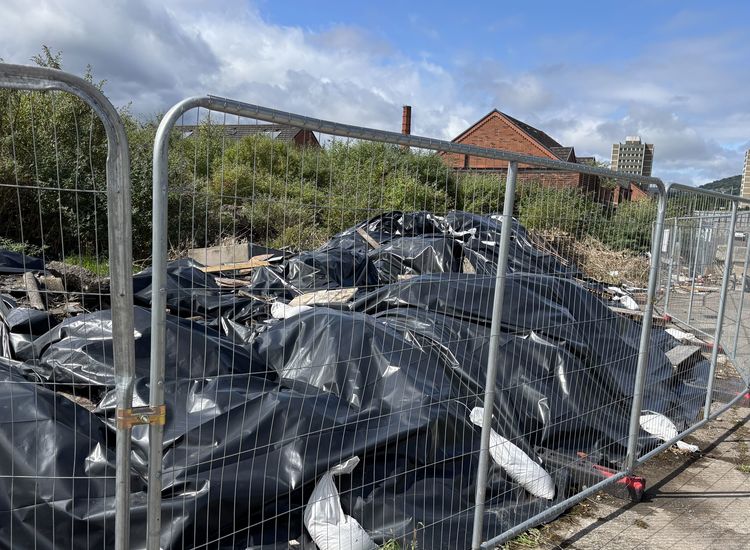President Higgins speaking in the General Assembly chamber on Wednesday, September 25.
Gathering as we are on the eve of the 75th anniversary of the founding of the United Nations, undertaking a range of summits on addressing Climate Action, Financing for Development, Health, the Sustainable Development Goals and the immediate challenges facing Small Island Developing States, we can be in no doubt as, not only to the complex and interdependent world we inhabit today, but of the interacting crises that now face us, that cannot be avoided - an ecological crisis as to our very existence. A global crisis of deepening inequality and a loss of social cohesion that creates a crisis for institutional credibility. All of these crises sourced in a global failure in relation to global, human need.
On such occasions as this, at the deepest level, we are also challenged to ask ourselves, are we being true to the values and principles of the UN Charter, are they informing our practices as UN members, and are these values being invoked to face the challenges that we debate this week?
For so many these questions are life and death realities. As we meet, the UN and its agencies are under attack, be it through underfunding, withdrawal of support, and now often so much the explicit promotion of the most narrow version of a theory of interests by the most powerful, the very antithesis to the multilateralism the Charter demands.
Ireland believes in the UN, supports its aims, is anxious to become ever more involved in its work. We must not be hesitant in speaking of how multilateralism have driven major advances for people across the world: building programmes for poverty alleviation, better healthcare and education, and women’s empowerment.
It is multilateralism that has allowed us to develop mechanisms for conflict resolution, peacekeeping and peace-building. The progress made in the development of international law is a testament to the significant steps for humanity we can take when the international community works in harmony. We must this week defend, strengthen and advocate for multilateralism.
For my country, Ireland, the UN anchors our foreign policy, and its Charter, institutions and personnel constitute a prism through which we view our situation in the world and how we wish our practices to be perceived and judged.
We view the UN as that special institution where newly free nations found a home after their struggles for independence, their emergence from the shadows, legacies and distortions of imperialism.
We see the UN as a forum that has been provided to give a voice to the voiceless, the marginalised and those lacking power and wealth. For so many, it is the only such forum available to them – and it is all-the-more important for that.
For Ireland, the UN is also a great peace project, one that strives for fair and sustainable global development; for the resolution of conflicts, both ancient and new; for the support of the many fleeing war, persecution, famine and natural disasters.
The UN, for all of us, must be a house of hope. It is a house where words have sought to matter, carry hope. Think of what hope was felt in the galleries of those who came in their early days of independence.
Remembering this legacy, I could not speak here today in good faith, or with authenticity in relation to the Charter, without acknowledging that the international order is now again under grave pressure.
The very idea of a rules-based order is being called into question and undermined. The international institutions – admittedly flawed and imperfect – which have been nurtured since 1945, and which have brought much benefit to our peoples, are the subject of questioning, withdrawal of support, and even attack.
The partnership, cooperation, mutual trust and respect that are at the heart of multilateralism are embedded in the rule of law and on values which aim to protect all individuals on this planet, their rights, aspirations and dignity, values that not have a single origin in time, culture or belief system.
Multilateralism is, of course, in its best practice, a system that acknowledges its foundation on a principle of compromise, of shared vision, of finding the capacity to put oneself in the language, thoughts and concerns of ‘the Other’. It allows the large and small, the powerful and weak, to co-exist in shared concern and joint prospect for the betterment of a shared world.
However, throughout the ages, history has shown us many times the error of thinking, of those who suggested that individual action – aggression or, as some might see it, adventurism – was a better way forward than the cooperative world multilateralism offers.
Never more than today is the call to more closely align our perspectives more apposite. Never more than today have our challenges been of such a global and momentous nature, and never more than today have the challenges and, frankly, the threats the world faces called out for us to recognise our collective responsibilities in terms of intergenerational justice.
To choose not to address these risks and challenges globally and multilaterally would be reckless. Rejecting the norms of collective, mutually respectful action taken together in favour of aggressive individual action, or to resile to an old, false and rhetoric of war promises a continuity of instability, imbalance, social inequality, exploitation in every aspect of shared life, chaos and, almost inevitably, further conflict.
Ireland does not believe that conflict is endemic to any region of the world, any people, class of values or belief system. We believe there are no conflicts that cannot be resolved when a real commitment is made to understanding of The Other is attempted by mutual work on agreement on post-conflict opportunities, the parking of alternative narratives of shared values and of course the institutional support that gives continuity of peace processes. This is what informs our view of conflicts in the Middle East region, including the Israel-Palestine conflict.
Ireland has experience of prolonged, intractable conflict – and of the painstaking work and compromises which pave the way for a peace settlement. For this reason, the Israel Palestine conflict resonates deeply with the Irish people.
We have a deep sense, from our own experiences, of the centrality of national identity and a sense of belonging, and how this persists through decades and centuries. Such a reality cannot be ignored nor suppressed nor circumvented. Peace processes have to find a way for different identities and narratives to coexist, by creating a space where they no longer have to compete in a zero-sum game and by finding a way to address historic and contemporary injustices.
In the case of Israel and Palestine, we are more than ever convinced that the needs of both peoples can only be fully achieved through two independent, secure and sovereign states, co-existing side by side, in mutual recognition and peace.
Both peoples have much to gain from this, in creating a new and stable equilibrium. We do not say this lightly – we know from our own experience that this will be an immensely challenging task, requiring enormous courage and difficult compromises. No peace process is simple or linear or without cost. But the only way to achieve lasting peace is through negotiations between the parties.
Ireland, and our EU partners, have made consistently clear that we will not recognise any changes to the pre-1967 borders, including those with regard to Jerusalem, other than those agreed by the parties.
We, as an international community, must ask again the leaders on both sides of this conflict to sit down, face-to-face, without delay. We must restate that a negotiated peace agreement, based on two states, will command unprecedented support, goodwill and an international determination to assist and protect and defend that peace with all the means at our disposal.
In the absence of progress on ground, collectively, we in this room, have a responsibility to bring forward ideas drawing on our own experience, to try to create and maintain momentum. On our own island, well before the negotiations that led to the Good Friday Agreement, we established a permanent Secretariat, in continuous session - it still sits today. Such structures can allow for the continuity of even the smallest achievements, the transcendence of what might appear to be impossible differences, and the emergence of original proposals.
Yes, the challenges facing the international community today – interconnected and truly global as they are – are numerous, and none is more urgent than climate action.
The devastating impact of Hurricane Dorian in the Bahamas tells us that the need for action is staring us in the face. We must show solidarity and support for the Bahamas and all countries in the front line of the climate emergency we are living through.
Climate change is moving so much faster than the efforts we are expending or enlisting to address it. Climate action is essential if we are to achieve the Sustainable Development Goals. The cost of inaction is catastrophic, far greater than what it will cost us to set out on a truly meaningful, corrective path. With the Paris Agreement, we have both the framework and the foundations to move forward.
The debate on climate action in some respects has not only provided, and continues to provide, hope for those of us who place our faith in the multilateral system. It has been revelatory in demonstrating how global issues can be inclusive, how the voices of the small and less powerful can hold sway and can provide a powerful lead. In this regard, the role being played by, for example, Small Island Developing States is exemplary.
Small Island Developing States, drawing on their expertise and their stark experience, have led the debate on climate change. I say to the representatives of Small Island Developing States that your challenging the status quo was with very good reason; your cultures and your very existence are at risk. You have a unique moral authority to speak out; you are paying an unbearable price for a problem you did not create.
The international community must recognise vulnerability and value it as a driver for action. The commitments in the 2030 Agenda are collective commitments – this is where the strength of the UN lies, but our greatest challenge is in delivering the consciousness, the will to realise that the damaging, dysfunctional connection with which we have lived between ecology, economy and society has brought us to the edge of a precipice. We need a paradigm shift in our thinking as to how we will combine ecology, economy, and social life so as to achieve meeting the greatest of human needs.
That connection with which we have lived has not only been exploitative, it has failed on its own terms. We must embrace the paradigm shift that is necessary if we are to achieve the sustainability we committed to in 2015 here in New York. We must see and promote the connection between the measures needed to respond to climate change, that will end the exclusions of global poverty, and meet the sufficiency needs of a global community in terms of food, nutrition, education, health and housing.
We will need together to muster the moral, intellectual and political courage to prevail in that to which we have committed ourselves to achieve, in the full knowledge that we will be opposed, at times divided, sought to be undermined by powerful, heavily resourced, unaccountable interests which can purchase media space, interests who have often stolen concepts and language itself, and who will seek to do so again.
We must all, North and South of our shared vulnerable planet, muster the courage to take action. After all, even allowing for scientific innovations and improvements, we will need to commit to making radical changes in the way we live, particularly those of us in the North. We cannot go on consuming as we are now doing.
There are grounds for hope in our making an appropriate response. In many respects, and in so many places, the people have been giving a public leadership in their response to assessments of the seriousness of the situation facing the global environment. Young people in particular have shown courage, innovation and resolve.
I agree with Secretary-General Guterres when he says that schoolchildren have grasped the urgency of climate action better than some global leaders. They, having accepted the science, with which they are more familiar than older generations, and understanding the consequences of our present models, see not just the prospect of their futures, but ways of life and the biodiversity on which our planets life depends, disappearing due to inaction and short-term thinking.
Young people, and citizens of all generations, are asking us now for more than a reassuring verbal response to climate change. They are seeking that authenticity that is revealed when words are turned into actions. They, these citizens made aware, are our allies for hope, responsibility and change. It is wrong to ask the UN as an institution to solely carry the burden for an authenticity that is the responsibility of us all.
That responsibility is on all of us as leaders and citizens to encourage those with whom we share this fragile planet, to create a yearning for such as that “vast and endless sea”, of which the French writer Saint-Exupéry spoke – a yearning for peace, justice, and freedom for all from fear.
The challenges are enormous. So many young people worldwide are not allowed achieve fulfilment, in employment, education or training; one-in-four are affected by conflict or violence; millions of girls become mothers while they are still children. We need to create an environment where young people, and all of our people, are seen as citizens with equal rights and as members of our societies with full rights of participation.
Young people are now at the leading edge of the rapid technological revolution we are living through, and this is important for much of the 2030 Agenda, the Paris Agreement and other international commitments can only be delivered with technological steps forward. For this to happen, we must ensure that technological advances serve all of humanity, that societies and their needs be the arrows not the targets for technology and its applications.
While technologies have made the world more connected, we also witness the ways they can be misused to spread xenophobia or hateful rhetoric. It is also essential that the fruits of new science and technology are turned to the promotion and preservation of peace, and not to a renewed pursuit and prosecution of war. This calls for an effective global level institutional initiative, effective and accountable in a multilateral way.
Ireland seeks to demonstrate our commitment to multilateralism in many practical ways. In the field of peacekeeping, today there are more than 600 Irish Defence Forces personnel deployed on UN missions, including more than 450 women and men on the UNIFIL mission in Lebanon. UN peacekeeping has deep public support in Ireland, and we are proud as a people to be the highest per-capita European Union contributor of troops to UN peacekeeping, with deployments to missions across the Middle East and Africa.
Ireland also remains strongly committed to the UN’s development work while, of course, realising that it has to be redefined to adjust to new circumstances of sustainability. It cannot be an introduction or an extension of what is failing.
To give direction to our commitment, we launched a new international development policy with a re-aligned focus on four priorities: gender equality, climate action, good governance and combatting poverty, all within the framework of the Sustainable Development Goals.
An important element of our development policy is a Small Island Developing States Strategy, developed following research and consultation with our SIDS counterparts. It was an honour for me to meet in Ireland with more than 30 Permanent Representatives from Small Island Developing States when the Strategy was launched earlier this year.
Ireland’s development policy also focuses heavily on humanitarian assistance or responses that are urgent and cannot be postponed. We will continue contributing to fragile and conflict-affected states with the goal of easing the plight of civilians in such places as the Central African Republic, Palestine, South Sudan, Syria, Yemen and elsewhere. As we do so, we acknowledge that this is a response to what is urgent. We do not see humanitarian response serving as an alternative to the deep structural changes we need in relation to trade, debt, technology transfer, and migration. They are inextricably intertwined.
How we respond to the needs of those forced to leave their homes due to conflict and instability is a test of our times and our common humanity.
I had the pleasure of hosting the High Commissioner for Refugees, Filippo Grandi, in Ireland recently. I introduced him to four families who have sought refuge in Ireland. At that meeting, where Mr Grandi once again spelled out the vital work his Office is doing, all of us present were reminded that we are all challenged to give authentic expression to what we mean by hospitality, to give meaning by our actions to our words.
I am very conscious that the most acute poverty is in zones of conflict, and that displacement of our fellow global citizens is increasing, be it from conflict, climate change or ethnic prejudice and hate. The UNHCR tells us that almost 71 million people have been forcibly displaced from their homes worldwide, with 26 million cross-border refugees.
It is important that we all acknowledge the generosity of the many states which shoulder a heavy burden at the front line, states such as Bangladesh, Chad, Ethiopia, Iran, Jordan, Kenya, Lebanon, Pakistan, Turkey and Uganda. I say to the peoples of these states, you humble us by hosting great numbers of persons displaced by conflicts in your neighbouring regions. Ireland, in its turn, will continue to support refugees and support those vulnerable host communities who are such an example in reminding us as to what a shared humanity must mean.
I applaud the leadership that Secretary-General Guterres continues to show on migration. Migration is central to our Irish consciousness. We are a migrant people, always have been from our origin, through our Famine, into the modern period. Our country, which historically has seen people leave in their millions, is now a country of net immigration. Today, one-in-six of our population was born outside Ireland. We have been transformed from a place where people were forced to leave, to a place that now has the opportunity to be a place of welcomes.
I fully agree with the Secretary-General when he says that the only way for migration to be sustainable and safe, not irregular and inhumane, is for it to be out of volition and not necessity. This means having integrated policies.
The vast majority of the world’s migrants move between countries in a safe and orderly way. However, unregulated migration exacts a terrible human cost: lives lost at sea and across deserts; and a cost in lives ruined at the hands of traffickers, unscrupulous employers and other exploiters.
Then too, how rarely it is that we hear of the positives, for example, the contribution of migrants to so many Member States’ economies and societies, or that, for example, 10-12% of global GDP is provided by migrants.
But whether their movement is voluntary or forced, all human beings must have their dignity upheld. A starting point for all of us – as the Global Compact on Migration makes clear – is that in a world where so much of migration is made inevitable and necessary, it should be well managed and safe, not irregular and dangerous, and this is something that can be achieved with goodwill and cooperation.
The coming General Assembly session will see some key moments for disarmament. We will mark the 50th anniversary of the entry into force of the Nuclear Non-Proliferation Treaty, and its tenth review conference. I am proud of Ireland’s role in developing the Treaty, and I reiterate our commitment to a successful Review Conference in 2020.
I hope that this conference sets a level of ambition for the total elimination of nuclear weapons, the only guarantee of our safety. It is for this reason that Ireland is also a strong supporter of the Treaty on the Prohibition of Nuclear Weapons.
One of the greatest challenges facing today’s global policymakers is how to anticipate and deal with complex risks, such as those associated with new weapon technologies.
While advances in science and technology, such as artificial intelligence, are progressing rapidly, with countless potential benefits to society, the international community must recognise and respond to the risks and threats posed by the incorporation of these new and emerging technologies into weapons and weapon systems. It is, for me, difficult to reconcile the rhetoric for peace, I hear from countries who accompany it with ever-increasing efforts at acquiring increased shares in global armament sales.
Ireland is deeply concerned about the devastating impact of conflict on civilians. The protection of civilians and full compliance with international humanitarian law face new and greater challenges as warfare increasingly moves from open battlefields to urban settings. The use of explosive weapons in populated areas is a particular cause for concern.
Ireland is proud to lead efforts to agree a political declaration among states, setting out how we, as an international community, can ensure full compliance with international humanitarian law. I look forward to inviting states to Ireland next Spring to agree a political declaration focusing on the protection of civilians from the effects of explosive weapons in urban warfare.
Ireland, like many Member States, is clear on the need to reform the Security Council. For any entity to have legitimacy it must reflect the make-up of the world in which it exists. Quite simply, as we all know, many areas of the world are either insufficiently represented in the Security Council, under-represented or not at all represented.
In particular, we continue to witness an historic unjust under-representation of Africa, which was still ruled by colonial powers when the UN came into existence and the Security Council established. Africans must be allowed to have a fair say in Council decisions affecting their own continent. We also want to see consideration of a designated role for Small Island Developing States. The increasing effect of climate change on international peace and security gives this proposal even greater urgency.
And just as the Security Council should reflect the composition of the UN’s membership, I want to repeat Ireland’s deeply held view that political reform of the Council would lead to a greater sense of participation, responsibility and ownership among the UN membership – something we believe would be positive for the functioning of the UN more widely – as well as more just. As we have said before, if the power of evidence and argument is to mean anything, then Ireland will keep trying to build a coalition for change.
Ireland will always value how the UN brings, and can bring, out what is best in us. We will continue to seek opportunities to test ourselves against what we aspire to be, including the achievement of the requirements of a new paradigm that combines ecology, social justice and economy in a way that achieves sustainability, social cohesion and global needs sufficiency. These are the values that are the driving force behind Ireland’s candidature for the UN Security Council for the 2021-2022 term.
We do not seek the support of the nations of the world to progress any narrow version of enlightened self-interest. We seek support for the opportunity to again be measured against aspiration, by the ideals of the Charter and our ability to contribute and help shape societies seeking to achieve equality, deepen democracy, build an enduring peace, and do so with a shared purpose and a consistent practice.









